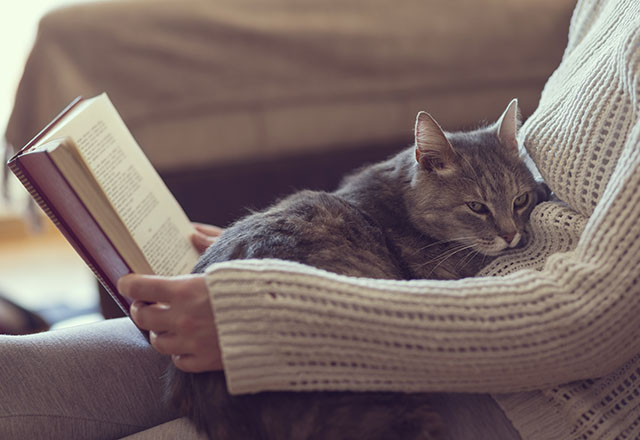As of 2018, there were 94.2 million pet cats owned in the United States, just slightly more than the 89.7 million dogs owned.1 These numbers show that cats are equally desired as pets in comparison to dogs, but the mindset that dogs are more social than cats and are more attached to their owners persists. In addition, pop culture is rife with examples of the “crazy cat lady” trope and other negative stereotypes of cat owners. What cat owner hasn’t had to defend their choice of pet using anecdotes to convince a skeptical audience that their cat really does like them? A study recently published in Current Biology is finally giving cat owners some science to back up their anecdotes.
Using research techniques applied to primates and dogs, as well as behavioral criteria established in human infant literature, Kristyn Vitale showed that cats display distinct attachment styles toward their human caregivers.2 In this study, cats spent two minutes in a novel room with their caregiver, followed by a two-minute alone phase and then a two-minute reunion phase. After this experiment, cats were classified into either secure or insecure attachment styles. During the reunion phase, cats showing secure attachment became less stressed and alternated between interacting with their owner and exploring the room. Cats showing insecure attachment remained stressed after the reunion and either avoided their owner entirely or clung to their owner and never resumed exploring.
This test was carried out on 70 kittens and 38 adult cats. The distribution of attachment styles was similar between the two groups, with 64.3% of kittens and 65.8% of adults showing secure attachment. Overall, the data supported their hypothesis that cats show a similar ability to form either secure or insecure attachments toward their caregivers as children (65% secure) and dogs (58% secure).

This paper really made me question why I didn’t decide to study animal cognition in graduate school. As a kid, I absolutely loved animals and wanted to be a veterinarian. When I was growing up, my family had two cats and a dog, and by the time I started graduate school I had adopted two cats of my own: Buddha and Nimbus. Adopting my cats reinforced what I learned as a child: Having pets makes me happier. The Centers for Disease Control and Prevention report that there are several benefits to pet ownership, including increased fitness, increased happiness and lower stress. While several of the physical health benefits are tied more to dog ownership, it comes as no surprise that so many of my fellow graduate students adopt cats as they can adapt to our constantly changing lab schedules. In addition, what graduate student doesn’t need some stress reduction?
I adopted my cats from the Baltimore Animal Rescue & Care Shelter (BARCS), and I have been volunteering with BARCS since 2015. BARCS is Maryland’s largest animal shelter and pet adoption center. On an annual basis, approximately 12,000 dogs, cats and other animals come to BARCS. In addition to adoption and fundraising, BARCS provides a variety of other services for the Baltimore community, such as spay/neuter surgeries, the Working Cat Program, low-cost vaccination and microchips, and many other services or programs. If you want to get some of the stress-reducing benefits of pet ownership but aren’t ready to adopt, I highly recommend volunteering with BARCS. It is a great way to give back to the greater Baltimore community.
References:
- Emma Bedford. Number of pets in the United States in 2017/2018. Statista. (2019) https://www.statista.com/statistics/198095/pets-in-the-united-states-by-type-in-2008/
- Vitale, KR et al. Attachment bonds between domestic cats and humans. Current Biology. (2019) https://doi.org/10.1016/j.cub.2019.08.036
- Vitale, KR et al. What’s inside your cat’s head? A review of cat cognition research past, present and future. Animal Cognition. (2015) https://doi.org/10.1007/s10071-015-0897-6
- Gan et al. Pet ownership and its influence on mental health in older adults. Aging & Mental Health (2019) https://doi.org/10.1080/13607863.2019.1633620
- BARCS homepage (https://barcs.org/) and volunteer information (https://barcs.org/volunteer/)
Related content
Want to read more from the Johns Hopkins School of Medicine? Subscribe to the Biomedical Odyssey blog and receive new posts directly in your inbox.
